Rosalie Brennan
Artist Statement
The method of working that continues to be most important to me, as I reflect on the course of my BFA studies, focuses on making paintings one image at a time. As our culture becomes increasingly preoccupied with the creation of new and incessant content, we've begun to lose the value of sitting with and honoring the complexities of a single work of art. I reference family photos, personal photos, and archival images in my work as a way to pay respect to the timelessness, intimacy, and remembrance that I feel only an oil painting can provide.
The women of my family, like many, are the bearers of culture and story. My mother's side of the family, the main faces and figures of The Love of Form is a Love of Endings, is made up of Jews who fled Budapest after the Hungarian Revolution. My maternal grandfather was my oldest surviving grandparent. When he died, I was given a box of his old photos. I use these photos in my paintings as a way to process the grief of losing him, as well as the culture, language, and memories that went with him. I’m particularly drawn to photos of people in fur, traditional Hungarian dress, or garish seventies fashion. I see something special in pairing the closeness of painting my loved one’s faces with the distance of a costume from a far away place and time.
I'm also drawn to paint compositions that reference Polaroid film and, subsequently, Instagram squares. Making paintings that are clearly based on photos expresses a state of mind that neither medium could communicate on its own. Somewhere between the instantaneous quality of an image captured by technology and the meditative quality of an image captured by painting lies a truthful depiction of memory.
It is important for me, in both landscape paintings and portraits, to paint settings that convey a specific atmosphere. I add crispness, humidity, artificial lighting, dusk, or dawn to my paintings to create elements of drama, introspection, noise, or memory. Sometimes the atmosphere in my paintings becomes so intense that it turns into a natural disaster, like a flood or a blizzard. This is another way for me to process grief in my work. I respect the fact that whether I want to let something go or not, nature can take it away from me.
The Love of Form is a Love of Endings is a line from the poem “Celestial Music” by Louise Glück. This line embodies the resolutions that I worked toward in this project. As I study the past lives of the people that I come from, I am also reflecting on my transition out of childhood and the changes and endings in my own life. I feel comfortable because, with painting, I have a way to release past experiences into forms that will continue to exist outside of myself.
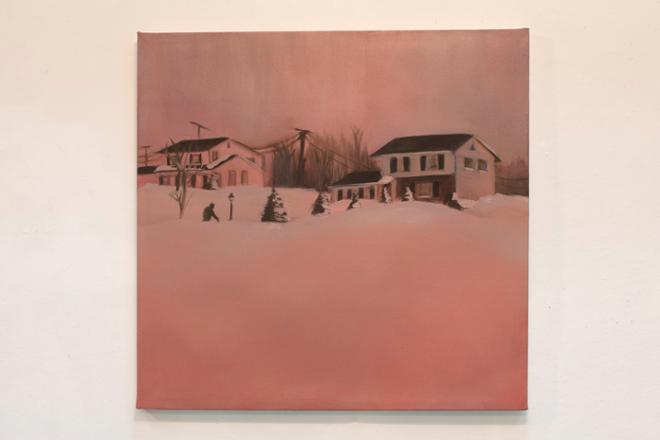 Click to view Pink snowy landscape with two houses in a tree-lined field. Full-Screen
Click to view Pink snowy landscape with two houses in a tree-lined field. Full-Screen
Fairport, 1976 // 36" x 36" // Oil on Canvas
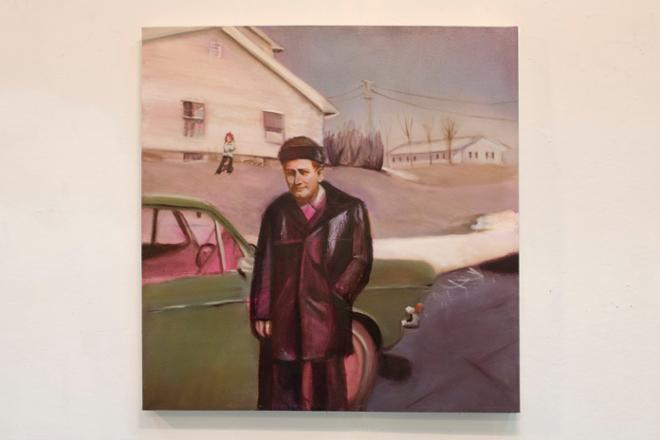 Click to view Man in a fur hat and dark jacket standing in front of a green car and a white house. Full-Screen
Click to view Man in a fur hat and dark jacket standing in front of a green car and a white house. Full-Screen
Fiat and a Fur Hat // 36" x 36" // Oil on Canvas
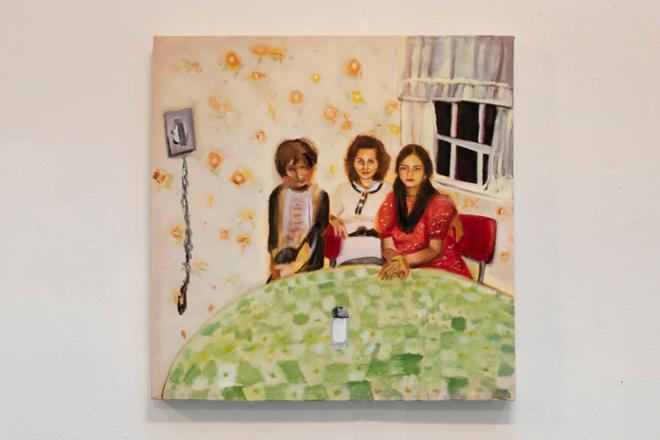 Click to view Three women sitting in front of floral wallpaper and a dark window at a green kitchen table. Full-Screen
Click to view Three women sitting in front of floral wallpaper and a dark window at a green kitchen table. Full-Screen
Stories, Storytellers // 24" x 24" // Oil on Canvas
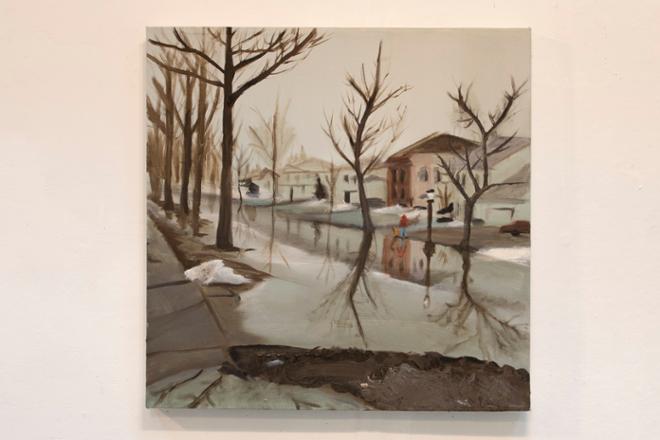 Click to view A flooded suburban street. Two figures in raincoats stand in the distance. Full-Screen
Click to view A flooded suburban street. Two figures in raincoats stand in the distance. Full-Screen
October Flood // 24" x 24" // Oil on Canvas
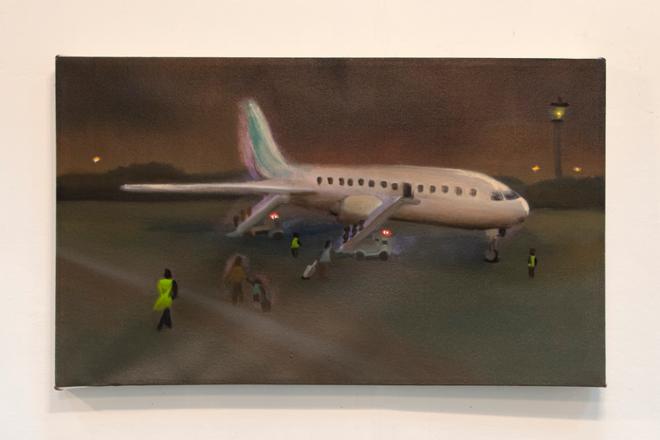 Click to view Dusky scene; passengers boarding an airplane on the Tarmac. Full-Screen
Click to view Dusky scene; passengers boarding an airplane on the Tarmac. Full-Screen
Big Jet Plane // 24" x 12" // Oil on Canvas
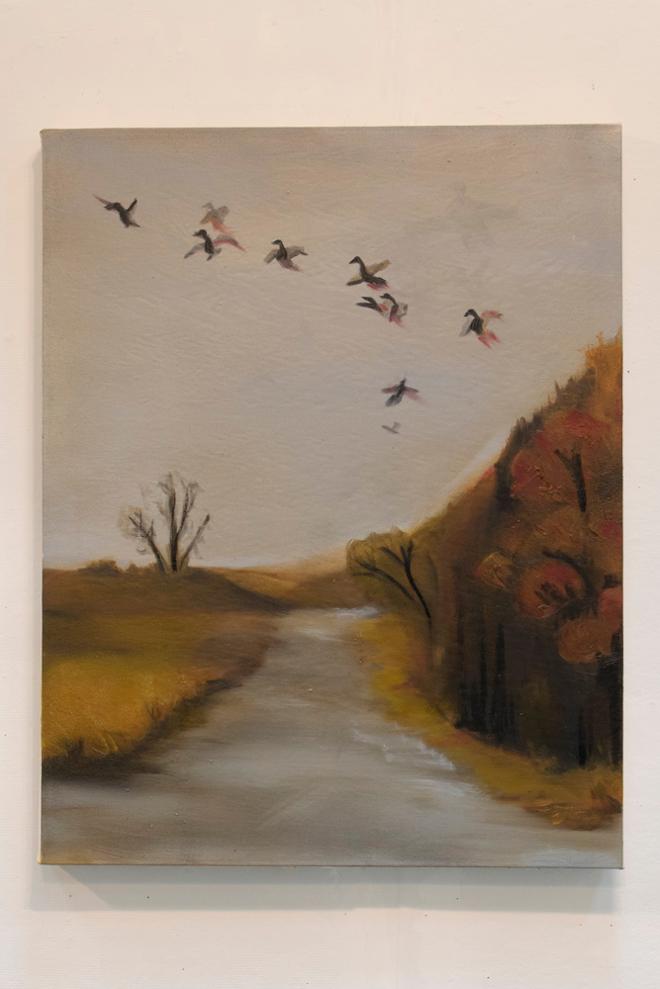 Click to view Flock of Canadian Geese flying over a river. Full-Screen
Click to view Flock of Canadian Geese flying over a river. Full-Screen
Wild Geese // 21" x 26.5" // Oil on Canvas
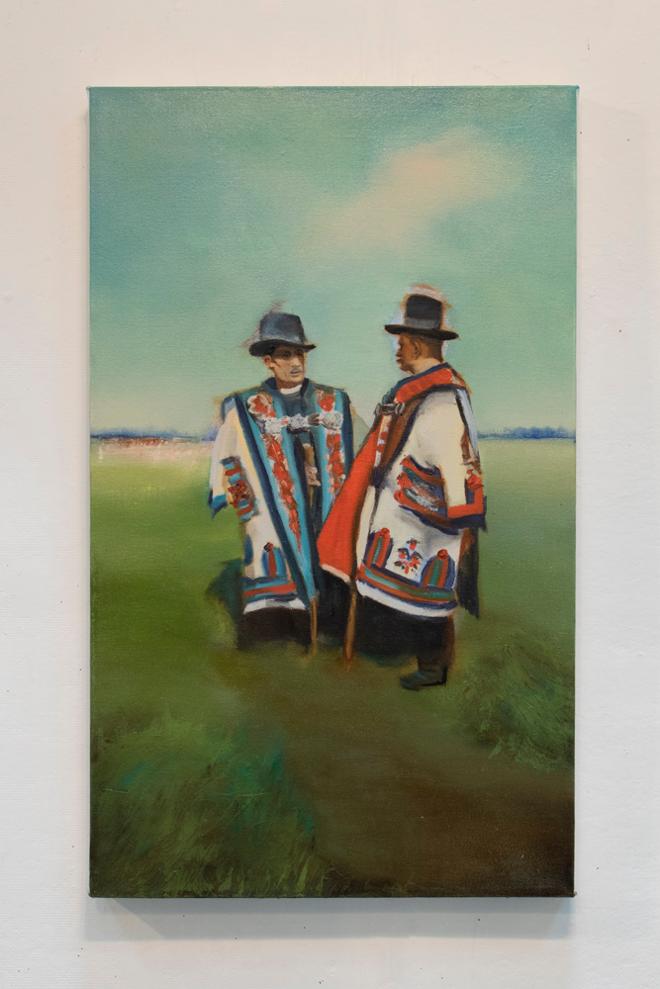 Click to view Two shepherds dressed in Hungarian folk costumes standing in a sunny field. Full-Screen
Click to view Two shepherds dressed in Hungarian folk costumes standing in a sunny field. Full-Screen
Budapest, 1929 // 12" x 24" // Oil on Canvas
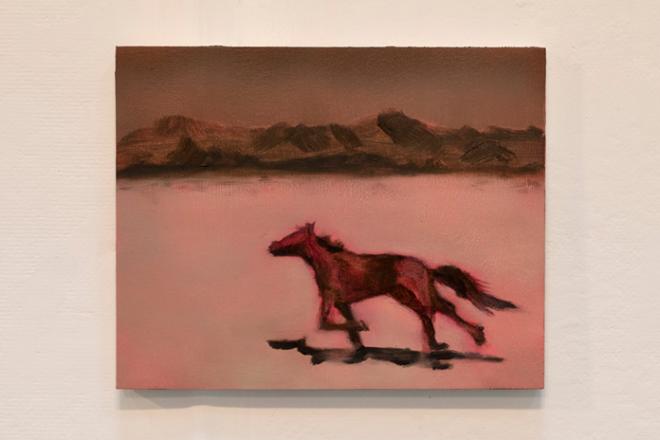 Click to view A pink mountain landscape with a galloping black horse. Full-Screen
Click to view A pink mountain landscape with a galloping black horse. Full-Screen
Wild Horse // 10" x 8" // Oil on Wood Panel
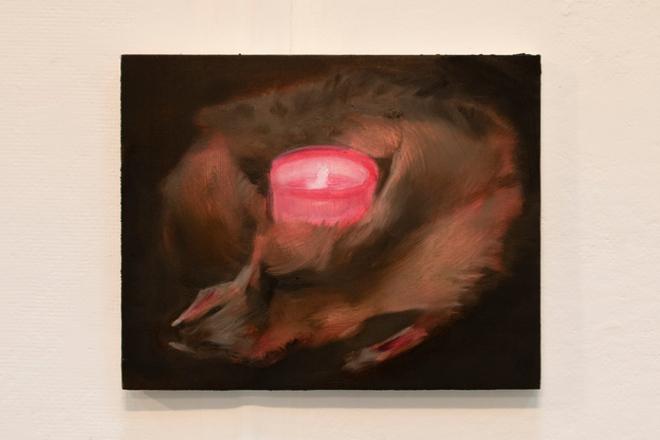 Click to view A fox fur curled up around a lit pink candle. Full-Screen
Click to view A fox fur curled up around a lit pink candle. Full-Screen
Pink Ghost // 10" x 8" // Oil on Wood Panel
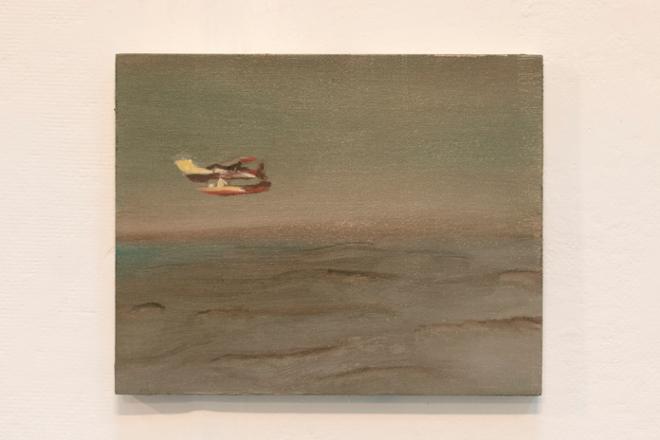 Click to view A red and white sea plane flying close to misty, choppy water. Full-Screen
Click to view A red and white sea plane flying close to misty, choppy water. Full-Screen
Sea Plane // 10" x 8" // Oil on Wood Panel
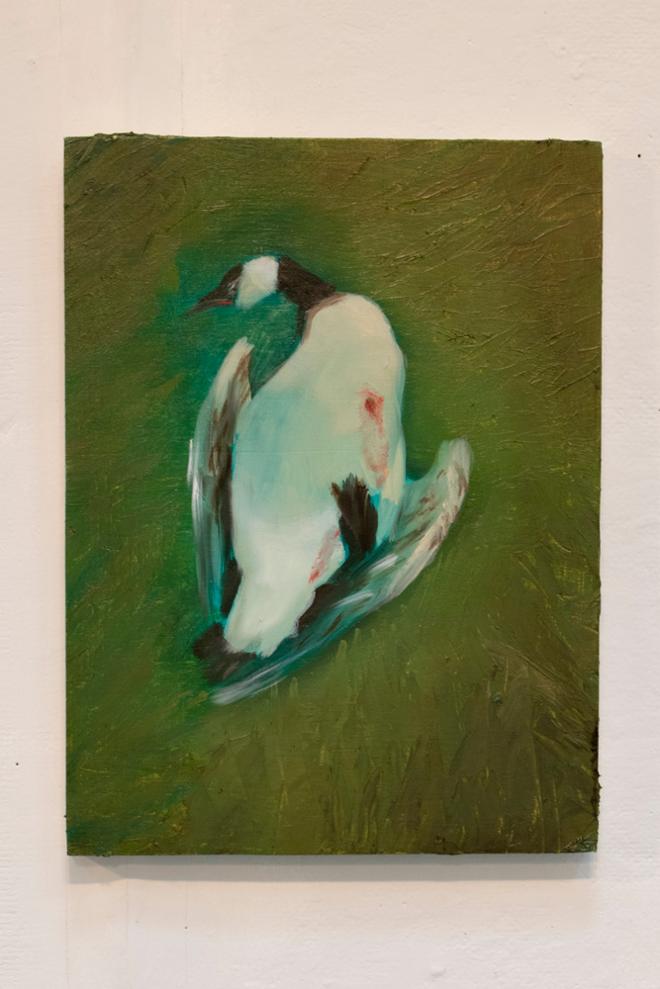 Click to view A turquoise goose with a bloody puncture wound lying in the grass. Full-Screen
Click to view A turquoise goose with a bloody puncture wound lying in the grass. Full-Screen
Blue Ghost // 9" x 12" // Oil on Wood Panel
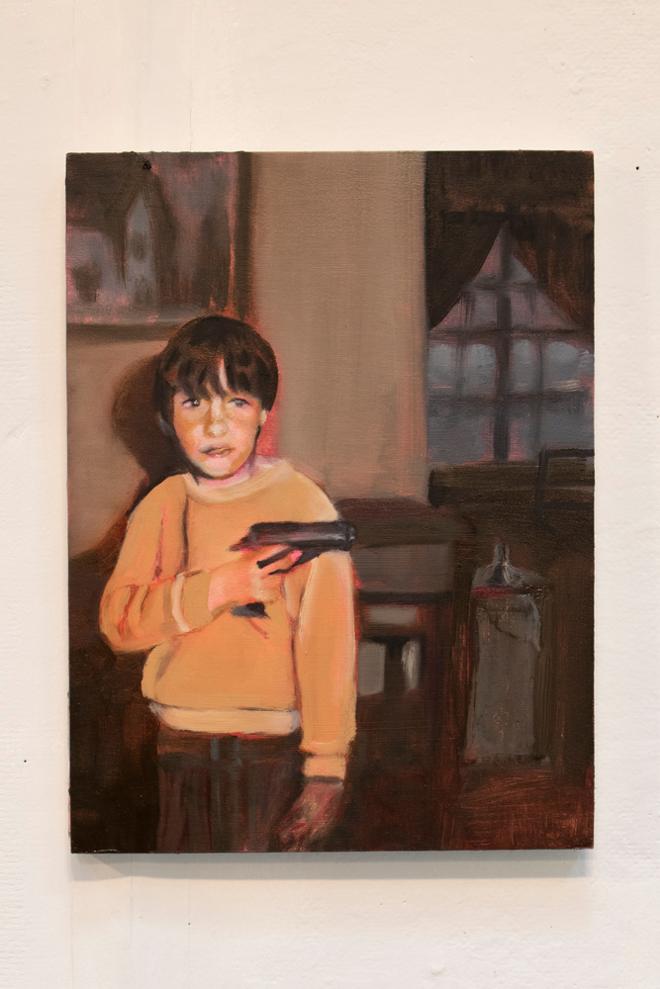 Click to view A little boy with a toy gun hiding behind a wall in a dark room. Full-Screen
Click to view A little boy with a toy gun hiding behind a wall in a dark room. Full-Screen
Little Marine // 9" x 12" // Oil on Wood Panel
